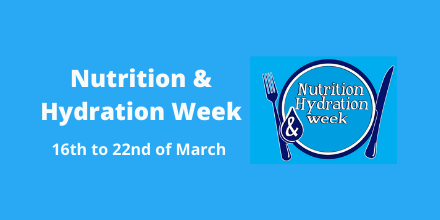
Today (Monday 16th March 2020), we are acknowledging the eight annual Nutrition & Hydration Week (N & H Week). The awareness day aims to highlight the importance and benefits of healthy nutrition and hydration practises.
Nutrition in the UK & Ireland
Poor nutrition and obesity are all too common in the UK and Ireland. In fact, according to Cancer Research UK, more than 6 in 10 adults are overweight or obese.
This can be backed up by the latest figures from Public Health England. Their findings suggest that only 31% of adults and 8% of teenagers meet the 5 A Day recommendation for fruit and vegetables.
While results from the 2018 Healthy Ireland Survey has found that just 37% of those surveyed eat five or more portions of fruit and vegetables a day, and 34% consume unhealthy foods at least once a day.
So how can you improve your eating and drinking habits?
- Eat fruit and veg: Not only will eating fruit and veg improve your nutritional intake, but many fruits and non-starchy vegetables such as grapes, watermelons, tomatoes, and lettuce, contain a lot of water and can help keep you hydrated as well.
- Know your quantities: The Eatwell Guide suggests that you should drink 6-8 glasses of water a day – which is around 1.2 to 1.5 litres. Dietitians also agree that while eating five a day is enough to get the protective benefits of fruit and veg – eating more portions will be more effective.
- Reduce your sugar intake: High sugar intake is linked to numerous ailments, including obesity, type 2 diabetes, heart disease, and many forms of cancer.
- Monitor how much caffeine and alcohol you drink: Caffeine and alcohol are both diuretics – meaning that they cause your body to remove fluids from your blood at a much quicker rate than other liquids. This results in the body becoming dehydrated.
- Keep track: Research into health and wellbeing mobile apps that keep track of your calorie intake and water consumption. Set yourself realistic goals and celebrate your milestones.
- Know the symptoms: It’s important for you to be aware of the symptoms of poor nutrition and dehydration. These include, but are not limited to; dizziness, dry skin, nausea and heart palpitations. This way, you will be able to take proactive and preventative measures when you notice any of these changes occurring.
Our mission is to create a global movement that will reinforce, focus, energise, create activity and engagement for nutrition and hydration as a fundamental element to maintaining the health and well-being for our global community.
Nutrition and Hydration Week aims to highlight, promote and celebrate improvements in the provision of nutrition and hydration locally, nationally and globally.
